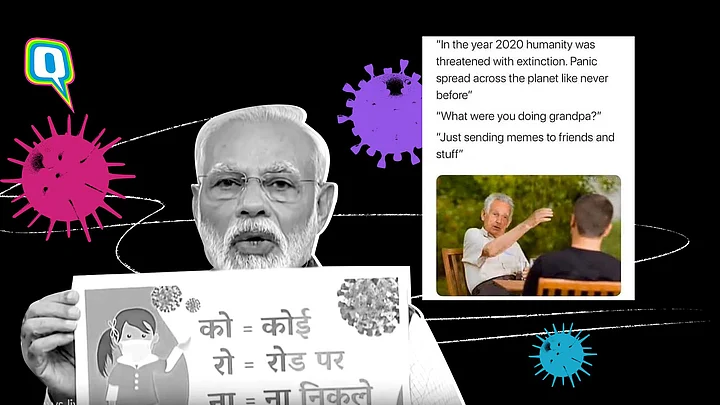On 24 March, when PM Narendra Modi announced a 21-day lockdown of India with a printed corona poster in his hand, he birthed a rather historical moment. As Modi mentioned “social media” in his speech, I realised that, even in the midst of a global crisis, internet culture had somehow found its way to national television.
In the past one week of social distancing and staying indoors, only one thing has truly remained constant - memes. (I’m kidding, a lot of things have actually remained constant)
As I (and everyone I know) spend hours scrolling through social media, I realise that the internet is flooded with coronavirus memes. But, unlike before, these memes are no longer just a humorous indulgence. In their own unique way, coronavirus memes have evolved into a coping mechanism of sorts. Mostly because they employ humour as a tool of navigating real life, which, at the moment, is myopic and scary. Coronavirus memes leave us with a transient but communal feeling of safety. They’re a virtual manifestation of the words “misery loves company”, but on a larger scale.
However, the universality of coronavirus memes within India, is what’s so unique and interesting. Even as I incessantly share memes on my Instagram and Twitter, I know that there’s a different social media universe out there where my parents are doing the exact same thing. In the past week of being stuck indoors with only my family for company, coronavirus memes have become the bedrock of our communication. Naturally, we’ve run out of things to talk about but these memes have kept us going.
Personally, my most surprising interaction with my mother was when she sent me this photo just before Modi’s 8 pm address to the nation.
When it comes to politics, my mother and I are often at loggerheads with each other. But if the world feels like it’s about to end, these differences don’t seem to matter anymore. And humour becomes a harmless tool of consolation.
Here’s another meme that has cracked my father up at least once every day. Every time I crib about not being able to go outside, he responds with the text in the following meme. Translating this meme would be difficult but it very subtly (or not subtly, depending on how you see it) asks people to stay home or else they will die.
A similar trend has also been noticed in South Africa where people instantly resorted to making humourous memes after the news of the first confirmed COVID-19 case in the country was announced. For South Africans, this isn’t the first time they’re using jokes, humour and memes to cope with a challenging situation. But for India, it might be the first of its kind given the kind of unity we’re witnessing.
But this limitless need to joke about serious things also has a flip side to it. A very ugly one at that. Even before coronavirus reached India, there was much talk about racist and xenophobic instances across the world. Such behaviour was being legitimised by internet memes with racist and xenophobic undertones.
(Since I don’t want to be promoting a racist meme culture, I won’t be posting any examples here but you can find some examples here.)
In India, too, instances of racism against those hailing from the Northeast have become rampant in the past few weeks. Most recently, a Manipuri woman in Delhi was spat on and called “corona” by a man riding a scooter. A similar incident occurred with actor Meiyang Chang of Indian Idol fame who was also called “corona” by two men on a bike.
It would be unfair and wrong to blame the increasing racism on meme culture but one also can’t deny the fact that social media and the internet at large have become a very influential part of our society today. Memes are no longer just a fun way of wasting time on the internet; they’re today a visual communication aid. Memes have also seamlessly been integrated into the political discourse in our country. Most recently, during the Delhi elections, both BJP and AAP had broken into a full-fledged meme-war on social media.
In the larger scheme of things, the COVID-19 pandemic is merely one event in the larger meme history of the internet. The only thing that makes it special is its universality. Never before have so many people in the world so strongly related to a single meme-d sentiment at the same time. As apocalyptic as the situation might seem, we’re all happy holding onto our little inside jokes that we share with everyone on the internet and I think that’s beautiful.
(At The Quint, we question everything. Play an active role in shaping our journalism by becoming a member today.)
